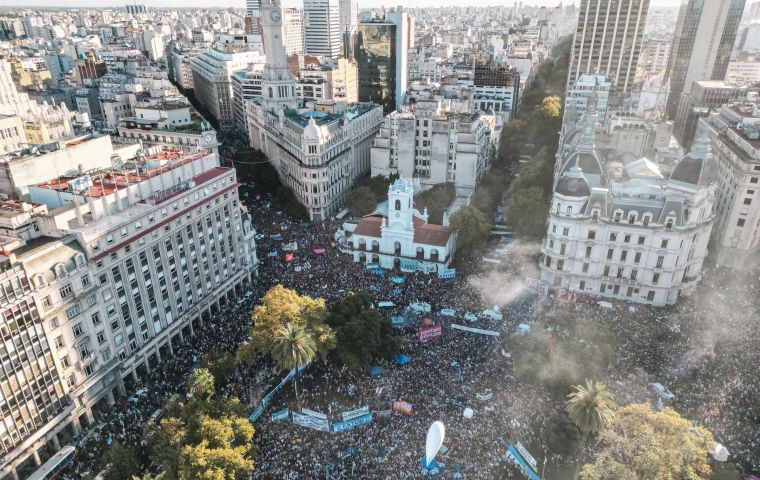MercoPress. South Atlantic News Agency
Massive demonstrations across Argentina defend public education amid budget cuts
 In Buenos Aires, the epicenter of the mobilization, demonstrators congregated in front of the Argentine Congress before marching towards Casa Rosada. Photo: EFE
In Buenos Aires, the epicenter of the mobilization, demonstrators congregated in front of the Argentine Congress before marching towards Casa Rosada. Photo: EFE Hundreds of thousands of students, teachers, and workers flooded the streets of Argentina in a historic display of unity against proposed budget cuts to public education. The demonstrations, which took place in over twenty cities across the country, marked one of the largest protests in the last 20 years of Argentine democracy.
In Buenos Aires, the epicenter of the mobilization, demonstrators congregated in front of the Argentine Congress before marching towards Casa Rosada, the seat of government. Amid chants and slogans, they voiced their staunch opposition to the 70% budget reduction proposed by President Javier Milei, which threatens the stability and accessibility of higher education in the country.
The scenes were emblematic of the solidarity and determination among Argentinians to defend their public university system, which many view as a critical avenue for social mobility and national development.
“It is a march to which one attends in a sad and anguished way, we do not go happy,” said the rector of the University of Buenos Aires (UBA), Ricardo Gelpi, hours before the march started. Gelpi defended the ideological plurality of a free university attended by more than 300,000 students and which leads the rankings in Latin America in several disciplines. “The indoctrination thing, with all due respect, sounds a bit ridiculous to me,” Gelpi responded to Milei on Radio Rivadavia.
“We are here to defend our right to education,” said Julián Araoz, a student from Tucumán as quoted by EFE, highlighting the importance of preserving and revitalizing the public university sector. “Before, it was possible to study. Our university functioned, had a budget to match, and our teachers were paid their salaries. But now, it's getting difficult.”

Amid chants and slogans, they voiced their staunch opposition to the 70% budget reduction proposed
by Milei, which threatens the stability and accessibility of higher education in the country. Photo: EFE
The proposed budget cuts have already begun to manifest in tangible ways, with some faculties experiencing deteriorating conditions and resource shortages. Felicitas, a student from La Matanza, expressed concern over the impact on her education, stating, “The lack of maintenance means that we cannot have classes because it floods when it rains. Added to this is the shortage of teachers, since there is no money to pay them.”
The Government perceived this march under a paternalistic and condescending look, where they would be “using” the students for “political interests”. In addition, they considered that the discussion for the budget allocations “is settled” and “transferred”, despite the fact that the vice-rector of the UBA, Emiliano Yacobitti, denied on several occasions that they reached an agreement.
The government's response to the demonstrations has been met with skepticism and criticism. President Milei's accusations of “indoctrination” and “brainwashing” by educators have been dismissed by many as attempts to delegitimize the protests. However, students and teachers remain resolute in their demands for adequate funding and support for public education.
The mobilizations have garnered widespread support from various sectors of society, including prominent human rights activists and political figures. Nobel Peace Prize winner Adolfo Pérez Esquivel and Taty Almeida of the Mothers of Plaza de Mayo Founding Line were among those who joined the march, underscoring the significance of education in fostering social justice and equality.
Despite government claims of reaching agreements with higher education institutions, rectors have emphasized that the underlying issues, particularly concerning teacher salaries, remain unresolved. The urgency of addressing these concerns has only been magnified by the looming threat of further closures and disruptions to the academic year.




Top Comments
Disclaimer & comment rules-

-

-

Read all commentsJust like I said before, the K goons will be out in force...a pity you can't be there in the front lines... ;)
Apr 24th, 2024 - 05:55 am +2As a scientist, I think it is terrible that Milei wants to cut university funding.
Apr 24th, 2024 - 12:25 pm +2Where would the world be without Argentina's contribution to science? For example, We wouldn't know that impotency drugs can help hamsters recover from jet lag or have learned about the brain by speaking backwards.
Maybe he just wants to remove some gnocchi from the universities?
Nice handle Zaphod. 42. Come and visit 'Casa Amarela”, the restaurant at the end of the universe ( https://www.instagram.com/casaamarela.veraneio/ )
Apr 24th, 2024 - 06:47 pm +1Commenting for this story is now closed.
If you have a Facebook account, become a fan and comment on our Facebook Page!